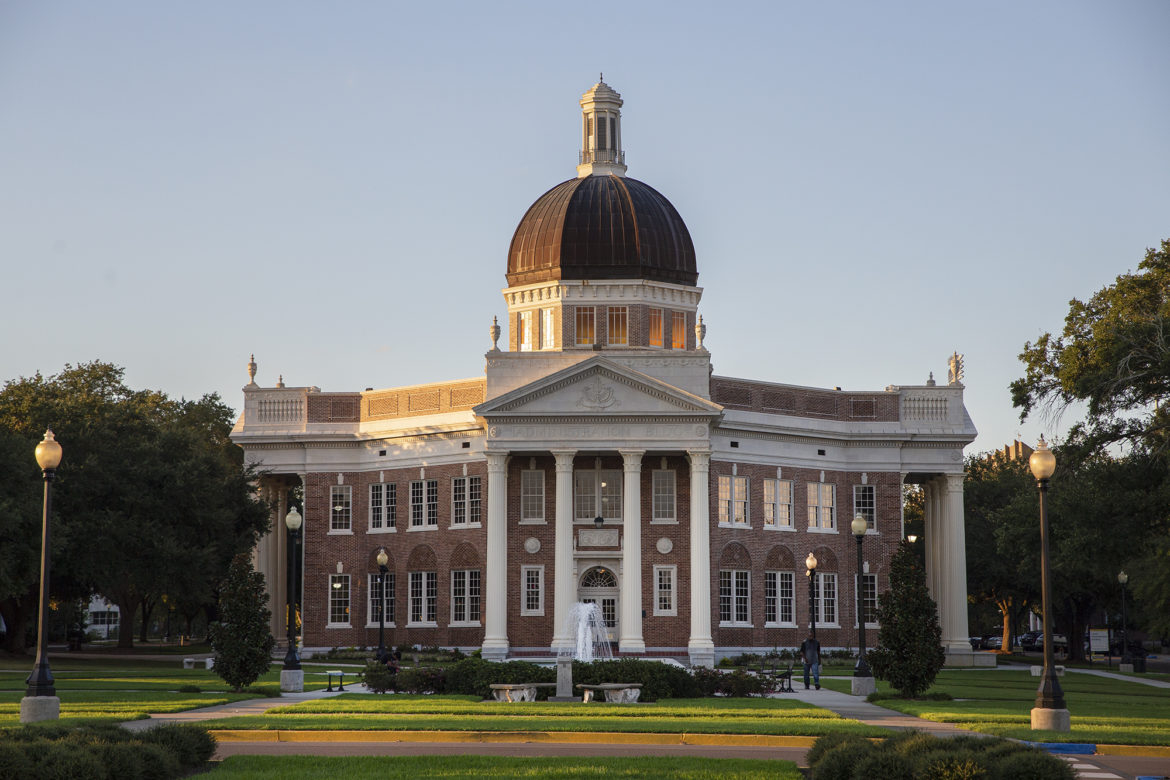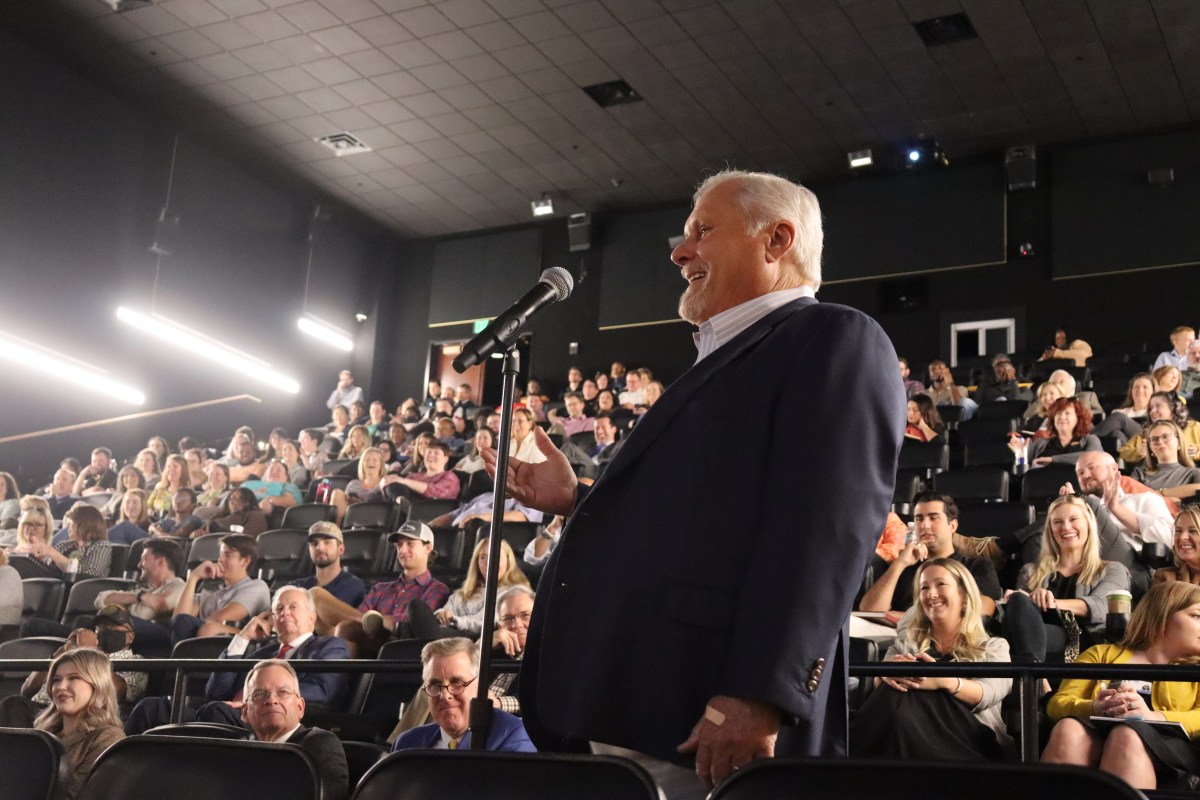Mississippi Today
A USM student spoke out about a candidate for provost. Then they got an email from one of the school’s biggest donors.


A USM student spoke out about a candidate for provost. Then they got an email from one of the school’s biggest donors.
The unsolicited email arrived in Emily Goldsmith’s inbox shortly before 6 p.m. on April 12 with a subject line that was short and to-the-point: “provost protest.”
Goldsmith, a graduate student at the University of Southern Mississippi, had recently been critical in the student newspaper about a growing controversy on campus: One of the finalists for provost — an administrator and finance professor named Lance Nail — had a checkered past at a former employer, Texas Tech University. A Title IX investigation found Nail reportedly mishandled a report of sexual misconduct and “failed in his responsibility as the Dean of the College.”
The news touched a nerve on campus where students had called on the university to adopt a zero-tolerance policy toward sexual assault a year and a half ago. More than 750 students, faculty and alumni signed a petition protesting Nail’s possible hiring. Goldsmith, whose pronouns are they/them, just so happened to be the only student quoted in the student newspaper. Still, they knew they were speaking for many when they said that hiring Nail “would communicate that all the university’s claims about diversity, inclusion, and equity were meaningless platitudes.” And, they began helping to plan a protest.
Days later, the email came through.
“You do not know me but my name is Chuck Scianna and I am the guy that Scianna Hall is named after,” it began.

Goldsmith knew of Scianna. The 93,000-foot building that bears his name in gleaming gold font faces U.S. Highway 49, a major thoroughfare in Hattiesburg. Scianna, an alumnus and co-founder of a major distributor of oil pipeline products, also happens to be one of USM’s largest individual donors along with his wife, Rita, having given more than $10 million. He is also “lifelong friends” with USM’s new president, Joe Paul.
But Goldsmith didn’t know why Scianna cared about their protest.
In the email obtained by Mississippi Today, Scianna wrote that he knew Goldsmith was planning to protest but asked them to consider that USM had hired a search firm, created a search committee and instituted a “process” to vet the candidates for provost and still, Nail had become a finalist.
“If you are going to protest the interviewing of Dr. Nail, should you not protest Dr. Paul and the search committee, the search firm and everyone else involved in the selection process,” Scianna wrote. “Should we just turn the university over to you and your group to hire the provost and run the university?”
In his 48 years of business, Scianna wrote, he had been accused of “many things that were not even close to the truth.” He suggested there was more behind the news articles about Nail, who he noted he had worked with “in the past.”
“I am not advocating that you should not have a voice, but it should be peaceful and armed with the facts, not just a google search,” he wrote, adding “I believe that if you have a conversation with him before you rely only on a google search you might have a different opinion.”
“You are completing a PhD,” he concluded. “Don’t you have to have an open mind to get the best out of an education? Does your program allow you to get all of your research facts from one source? I am only asking that you go into this with an unbiased opinion of Dr. Nail and let the process pick the best candidate.”
USM did not return a comment by press time, but Scianna’s email offers a look at how university donors in Mississippi, who have extraordinary access to powerful administrators, view the role of community feedback in the largely confidential search-and-selection process of key university hires. It also speaks to whose voices get results from university administration.
Goldsmith felt shaken and intimidated by Scianna’s email.
“I do think it’s troublesome to discount the students who are saying they have feelings about this,” Goldsmith said. “This is their campus. Even if we’re going to say ‘majority rules,’ nobody has made a petition to say that we should hire Lance Nail, so it’s not like there’s this loud opposite voice.”
Goldsmith didn’t reply to Scianna and forwarded the email to their dissertation advisor — their immediate superior — who then sent it up the chain. Scianna’s email soon started circulating among faculty before it ultimately made its way to Chris Winstead, the dean of the College of Arts and Sciences.
Troubled by the message, Winstead texted and called Paul about it, according to another email shared with Mississippi Today.
“I do think that there is a power dynamic at play,” Goldsmith said. “Perhaps it would not have been unusual if I had had prior overlap (with Scianna) or conversations or a personal connection or even perhaps if I was in the College of Business.”
Scianna told Mississippi Today that he was just trying to offer Goldsmith some advice — not telling them not to protest. “Read the email. It’s very clear. There’s no threat,” he said.
“The higher up you get in any organization, you’re more susceptible to people finding fault with what you do, finding fault with your decisions and then the narrative gets misconstrued — a lot of times by the media, to be honest, because they don’t go out and get all the facts or look at both sides,” he said.
The controversy started earlier this month after USM announced that Nail was one of four finalists for provost, the university’s chief academic officer. Students at USM promptly dug into his history — and had concerns about what they found.
Nail became dean of Texas Tech’s business college in 2012, after spending four years at USM’s College of Business. In 2015, Nail let go of a business school professor, reportedly a friend of his, who had been accused of sexual misconduct, according to KCBD. But the Title IX investigation, which Nail said had “inaccuracies,” found that he still invited the former business professor to a university trip to Chile, where the professor harassed a female student.
Later that year, Nail resigned from Texas Tech after the university determined he had broken its grading policies.
Nail, who was visiting the USM Gulf Park campus on Monday, didn’t return an inquiry from Mississippi Today before press time. In a comment to SM2, the student newspaper, Nail wrote that “the many Southern Miss colleagues I worked with” could attest to his character, particularly his former students and “those who served on the Business Advisory Council who supported my mission to graduate ethical business leaders from Southern Miss.”
Scianna told Mississippi Today that he is one of those colleagues who served on USM’s Business Advisory Council, which advises the dean of the business college. He said he worked closely with Nail, reviewing the college’s curriculum to see how it “would be beneficial to my company” and recruiting students for internships or non-profit projects that he declined to share more details about.
But perhaps the biggest project Scianna and Nail collaborated on was the construction of Scianna Hall, a more than $30-million project. At the time, Scianna’s $6-million donation was the USM Foundation’s largest one-time gift from an alumnus.
As dean, Nail had a key hand in stewarding the campaign to build the business school. He lists the project as one of his significant professional accomplishments on the first page of his resume.
“He didn’t just walk in one day and say ‘Will you write a check?’” Scianna said.
After Nail left USM, Scianna said the two stayed “acquaintances.” He said he didn’t recommend Nail for the position or express a preference for Nail to anyone on the search committee.
“I’m not impartial,” he said. “I want the very best candidate, but I want the process to work out. My email to Emily has nothing to do with Lance Nail. It’s with the way that it’s being approached. … Don’t make your decision based on Google searches.”
Scianna has served on search committees for key hirings at USM before, most recently last year when he was on the committee convened by the Institutions of Higher Learning Board of Trustees to select the university’s next president. When it comes to the hiring process, he said that unlike the majority of students, faculty and alumni, the search committee has access “to all the facts.”
“Shouldn’t their decision weigh more?” he said. “I mean, we don’t like chocolate ice cream. Let’s have a protest. Should we ban chocolate ice cream? Should we have the facts? And that’s all I’m saying.”
He said he wasn’t sure what a protest — no matter how large — could accomplish when the university ultimately makes a hiring decision based on the help of the search committee and the headhunting firm.
“What if a thousand people got together and said your newspaper was dishonest, didn’t report the truth?” he said. “Should there be an investigation? You know, I don’t know. That’s, that’s, I’m just not smart enough, I guess, to figure that out.”
USM’s provost 13-person search committee does include two student voices — the SGA presidents of the Hattiesburg and Gulf Park campuses — but Goldsmith said the process should be more transparent so that all students can be heard. They suggested the university share the steps that were taken to vet Nail before he became a finalist.
And while they don’t plan to ask Nail any questions when he visits campus Tuesday, they will attend the protest they helped organize in USM’s designated free speech zone in the middle of campus.
“I do think generally that undergrad and graduate students should be made more aware of administrative hiring,” they said. “There isn’t always a ton of transparency in higher education. Sometimes students don’t even know to look at this stuff … but I have learned through this process that many undergrad students do care. They’re not thoughtless, they’re not uninvolved. They are thinking, they are thoughtful, they are involved.”
Scianna, who is back in his office in Waller, Texas, after visiting Hattiesburg this weekend, doesn’t plan to see the protest for himself because his philanthropy shows his dedication to USM.
“I don’t have to be part of this,” he said. “They can do what they want to do. I mean, talk, beat your drum, do whatever. But let your actions speak for yourself.”
This article first appeared on Mississippi Today and is republished here under a Creative Commons license.
Mississippi Today
‘Trainwreck on the horizon’: The costly pains of Mississippi’s small water and sewer systems

This is the first of a two-part story.
“This state ain’t nothing but a big Jackson,” Central District Public Service Commissioner De’Keither Stamps said during a December meeting that harkened back to his time as a capital city councilman. “We got a whole statewide trainwreck that’s on the horizon.”
Over a thousand drinking water systems, most of them small, and hundreds of additional sewer systems operate in Mississippi. Nearly 60 percent of those water systems, according to the Environmental Protection Agency, have committed a violation in the last three years, and one in three sewer systems in the state have violated pollution limits in just the last year.
In 2014, a couple in DeSoto County, the wealthiest part of the state, sent a letter with photos of their yard to the Mississippi Department of Environmental Quality. Tarnishing their garden were small clumps of feces and wads of wet toilet paper stuck together.
“When having company with children playing in our backyard last summer, suddenly, water and sewage began rushing out of the back flow valve, into the flower bed, across our yard and into the backyard where the children were playing,” the Olive Branch couple wrote. “Everyone had to come inside due to the sewage rushing in our yard…This went on for several hours.”
The culprit, MDEQ later identified, was the malfunctioning collection system at the Belmor Lakes Subdivision sewage treatment facility, which serves about 200 people. The couple continued sending complaints the next four years, while the state sent repeated notices of violation to the plant’s operator. The facility allowed sewage overflows from at least 2011 to 2020, records show, and it remains out of compliance to this day.
Another facility, at the Openwood Plantation in Vicksburg, exceeded fecal coliform limits as early as 2004. A 2011 inspection noted the plant’s effluent structure “has been leaking for at least two years, still not repaired.” The next year, a neighbor complained to MDEQ about a funky smelling green liquid on their property. The agency found not only was the treatment plant responsible, but it also leaked raw sewage that flowed into a local recreational lake. Over two decades after the initial violation, the facility still regularly exceeds, by significant degrees, water pollution limits for chemicals such as E.coli, chlorine and ammonia nitrogen.
Small water and sewer systems around Mississippi have for years struggled to stay afloat because of, to some degree, the nature of being a small water or sewer system. Now, as they try to correct deficiencies during a time of growing regulations and higher costs, many cash-strapped systems are facing the hard reality of needing to raise rates for necessary services in the country’s second poorest state.


“System officials think that part of the job is to hold rates at a low level, and that doesn’t necessarily jive with what the need is,” said Bill Moody, director of the Bureau of Water Supply at the Mississippi State Department of Health.
Moody spoke anecdotally of system owners who bragged about keeping rates low, unaware of the revenue shortfall they would soon have.
A 2023 EPA report on funding needs for drinking water systems found that, over the next 20 years, Mississippi will have an $8.1 billion need. That equals $2,751 per Mississippian, the fourth largest per capita need of any state. Small systems in the state had a per capita need 26% higher than that, the report’s data shows, equalling $3,456 per person.

The United States, and especially Mississippi, suffers from what industry wonks call “fragmentation.” Compared to other countries, the U.S. has a spread out population, meaning its utilities are spread out, too. But by having so many water and sewer systems serving small pockets of people, scant infrastructure funding is spread to the point it loses spending power.
“ The problems the city of Jackson has had, for instance, is replayed over and over and over again in these smaller systems,” said MDEQ executive director Chris Wells. “ What you have is these small systems that, for one reason or other, aren’t properly functioning.”
For instance, Wells explained, a developer with no utility experience might build and operate a sewage lagoon to serve a subdivision. Sometimes the developer moves or dies and passes the reins onto the homeowners association.
“We’ve had situations where the person who built the lagoon or the treatment system literally disappears, abandons the system,” Wells said.
While consolidating small systems would help, experts say, some are so far behind that their customers’ bills will go up regardless.
!function(){“use strict”;window.addEventListener(“message”,(function(a){if(void 0!==a.data[“datawrapper-height”]){var e=document.querySelectorAll(“iframe”);for(var t in a.data[“datawrapper-height”])for(var r,i=0;r=e[i];i++)if(r.contentWindow===a.source){var d=a.data[“datawrapper-height”][t]+”px”;r.style.height=d}}}))}();
“It gets a little depressing, I don’t know what the answer is,” Greg Pierce, a water policy expert at the University of California, Los Angeles said. “Usually these systems are under-maintained. They have low rates, but they also have low quality and low reliability.”
Each year, the Health Department takes the temperature of the state’s drinking water systems. In the last two years, the agency found 83 providers that were in “poor” condition. While the median population for a water system in Mississippi is around 1,400 people, that number drops to 422 for the “poor” performing systems, about 80% of which serve under a 1,000 people.
In the small town of Utica, for instance, the Reedtown Water Association has frequent power outages and boil water notices. Stamps, the Public Service commissioner for the area, said necessary repairs would cost $4 million to $5 million, “an amount far beyond what the water association and its (1,200) customers can afford.”
One water association with just 829 customers – Cascillia, in Tallahatchie County – had 83 violations in just the last 5 years, including exceeding arsenic limits in 2023. Several other small water systems (such as the Moore Bayou Water Association in Coahoma County, or Truelight Redevelopment in Sharkey County) are considered “serious violators” by the EPA for, in part, not meeting limits on disinfectant byproducts that were set in 2006. Of the state’s 19 “serious violators,” more than half serve 1,200 or fewer people. The EPA defines a small water system as serving 3,300 people or fewer.

Smaller systems struggle nationwide. A 2018 study from researchers at the University of California, Irvine and Columbia University found that systems in rural areas around the country see “substantially” more violations than those in urban areas.
Wells, of MDEQ – which oversees sewer compliance – said it’s a challenge motivating struggling systems to meet permit limits. The state can technically take over a system, but MDEQ doesn’t have the resources to do so, and levying large fines can be counterproductive because ratepayers ultimately have to make up the difference.


“Every dollar that we take in penalties is one less dollar that the community has to spend toward the upgrades that they need to make,” he said.
Wells described that, for some repeat offenders, sending them violation notices is like “trying to get blood out of a turnip.” While MDEQ works with systems to correct deficiencies, he said, sometimes the best answer is a third-party utility coming in to save the day.
The American Society of Civil Engineers’ 2024 “Infrastructure Report Card” estimated that Mississippi, between all its water and sewer systems, needed $9.4 billion in investments over the next 20 years.
“The capacity of drinking water systems in the state is mediocre,” the report says, adding that “wet weather conditions, inconsistent maintenance, and a lack of rehabilitation pose extreme threats to the state’s wastewater infrastructure.”

Between the historic amounts of federal funding from the American Rescue Plan Act and the Infrastructure Investment and Jobs Act, Mississippi received roughly $1.2 billion for water and wastewater improvements, or just 13% of the state’s projected need.
Especially with large expenses looming to meet the new national standards for PFAs, some small systems are looking to consolidate to ease financial headaches. The Oxford Eagle reported last year, for instance, that the Punkin Water Association would soon join the city of Oxford’s service area after years of water quality issues.
But given the spacial challenges of connecting far apart systems – especially in Mississippi, which, according to Census data, has the fourth most rural population of any state – some say there are limits to how much water providers can actually unify.

“When it comes to the physical pipes in the ground, you can’t move them,” said Mildred Warner, a professor of city and regional planning at Cornell University, explaining that many systems can only consolidate in terms of management.
Mississippi is experimenting with consolidating management for some of its small, privately owned water and sewer systems. In 2021, a company called Great River began buying struggling systems around the state. A subsidiary of the national firm Central States Water Resources, the company focuses on struggling, poorly financed systems that most large utility firms wouldn’t touch. Now operating in 11 states, the company has access to more resources than what a small operator would, and can reduce overall costs by spreading them out throughout its service area.
In Mississippi, part of the PSC’s job is to make sure private utilities that have a monopoly over a given service area, like Great River, only charge customers for what their services are worth, plus enough profit to stay in business. Given the challenges of some small systems in the state, the PSC welcomed the company’s help. But Great River, as is common when a large private utility takes over, quickly imposed steep rate increases to fund its repairs.
As Great River’s ratepayers plead with the PSC to soften the financial blow, the condition of some Mississippi water and sewer providers suggest those basic services will have to cost much more than they used to, especially for customers of small systems.
Part two of this story will further explore the Great River’s impact on ratepayers, and what the future holds for small water and sewer systems struggling to stay afloat.
This article first appeared on Mississippi Today and is republished here under a Creative Commons Attribution-NoDerivatives 4.0 International License.![]()
Mississippi Today
On this day in 1939, Billie Holiday recorded ‘Strange Fruit’

April 20, 1939

Legendary jazz singer Billie Holiday stepped into a Fifth Avenue studio and recorded “Strange Fruit,” a song written by Jewish civil rights activist Abel Meeropol, a high school English teacher upset about the lynchings of Black Americans — more than 6,400 between 1865 and 1950.
Meeropol and his wife had adopted the sons of Julius and Ethel Rosenberg, who were orphaned after their parents’ executions for espionage.
Holiday was drawn to the song, which reminded her of her father, who died when a hospital refused to treat him because he was Black. Weeks earlier, she had sung it for the first time at the Café Society in New York City. When she finished, she didn’t hear a sound.
“Then a lone person began to clap nervously,” she wrote in her memoir. “Then suddenly everybody was clapping.”
The song sold more than a million copies, and jazz writer Leonard Feather called it “the first significant protest in words and music, the first unmuted cry against racism.”
After her 1959 death, both she and the song went into the Grammy Hall of Fame, Time magazine called “Strange Fruit” the song of the century, and the British music publication Q included it among “10 songs that actually changed the world.”
David Margolick traces the tune’s journey through history in his book, “Strange Fruit: Billie Holiday and the Biography of a Song.” Andra Day won a Golden Globe for her portrayal of Holiday in the film, “The United States vs. Billie Holiday.”
This article first appeared on Mississippi Today and is republished here under a Creative Commons Attribution-NoDerivatives 4.0 International License.![]()
Mississippi Today
Mississippians are asked to vote more often than people in most other states

Not long after many Mississippi families celebrate Easter, they will be returning to the polls to vote in municipal party runoff elections.
The party runoff is April 22.
A year does not pass when there is not a significant election in the state. Mississippians have the opportunity to go to the polls more than voters in most — if not all — states.
In Mississippi, do not worry if your candidate loses because odds are it will not be long before you get to pick another candidate and vote in another election.
Mississippians go to the polls so much because it is one of only five states nationwide where the elections for governor and other statewide and local offices are held in odd years. In Mississippi, Kentucky and Louisiana, the election for governor and other statewide posts are held the year after the federal midterm elections. For those who might be confused by all the election lingo, the federal midterms are the elections held two years after the presidential election. All 435 members of the U.S. House and one-third of the membership of the U.S. Senate are up for election during every midterm. In Mississippi, there also are important judicial elections that coincide with the federal midterms.
Then the following year after the midterms, Mississippians are asked to go back to the polls to elect a governor, the seven other statewide offices and various other local and district posts.
Two states — Virginia and New Jersey — are electing governors and other state and local officials this year, the year after the presidential election.
The elections in New Jersey and Virginia are normally viewed as a bellwether of how the incumbent president is doing since they are the first statewide elections after the presidential election that was held the previous year. The elections in Virginia and New Jersey, for example, were viewed as a bad omen in 2021 for then-President Joe Biden and the Democrats since the Republican in the swing state of Virginia won the Governor’s Mansion and the Democrats won a closer-than-expected election for governor in the blue state of New Jersey.
With the exception of Mississippi, Louisiana, Kentucky, Virginia and New Jersey, all other states elect most of their state officials such as governor, legislators and local officials during even years — either to coincide with the federal midterms or the presidential elections.
And in Mississippi, to ensure that the democratic process is never too far out of sight and mind, most of the state’s roughly 300 municipalities hold elections in the other odd year of the four-year election cycle — this year.
The municipal election impacts many though not all Mississippians. Country dwellers will have no reason to go to the polls this year except for a few special elections. But in most Mississippi municipalities, the offices for mayor and city council/board of aldermen are up for election this year.
Jackson, the state’s largest and capital city, has perhaps the most high profile runoff election in which state Sen. John Horhn is challenging incumbent Mayor Chokwe Antar Lumumba in the Democratic primary.
Mississippi has been electing its governors in odd years for a long time. The 1890 Mississippi Constitution set the election for governor for 1895 and “every four years thereafter.”
There is an argument that the constant elections in Mississippi wears out voters, creating apathy resulting in lower voter turnout compared to some other states.
Turnout in presidential elections is normally lower in Mississippi than the nation as a whole. In 2024, despite the strong support for Republican Donald Trump in the state, 57.5% of registered voters went to the polls in Mississippi compared to the national average of 64%, according to the United States Elections Project.
In addition, Mississippi Today political reporter Taylor Vance theorizes that the odd year elections for state and local officials prolonged the political control for Mississippi Democrats. By 1948, Mississippians had started to vote for a candidate other than the Democrat for president. Mississippians began to vote for other candidates — first third party candidates and then Republicans — because of the national Democratic Party’s support of civil rights.
But because state elections were in odd years, it was easier for Mississippi Democrats to distance themselves from the national Democrats who were not on the ballot and win in state and local races.
In the modern Mississippi political environment, though, Republicans win most years — odd or even, state or federal elections. But Democrats will fare better this year in municipal elections than they do in most other contests in Mississippi, where the elections come fast and often.
This article first appeared on Mississippi Today and is republished here under a Creative Commons Attribution-NoDerivatives 4.0 International License.
-

 News from the South - Alabama News Feed6 days ago
News from the South - Alabama News Feed6 days agoFoley man wins Race to the Finish as Kyle Larson gets first win of 2025 Xfinity Series at Bristol
-

 News from the South - Alabama News Feed7 days ago
News from the South - Alabama News Feed7 days agoFederal appeals court upholds ruling against Alabama panhandling laws
-

 News from the South - North Carolina News Feed5 days ago
News from the South - North Carolina News Feed5 days agoFDA warns about fake Ozempic, how to spot it
-

 News from the South - Missouri News Feed3 days ago
News from the South - Missouri News Feed3 days agoDrivers brace for upcoming I-70 construction, slowdowns
-

 News from the South - Virginia News Feed5 days ago
News from the South - Virginia News Feed5 days agoLieutenant governor race heats up with early fundraising surge | Virginia
-

 News from the South - Georgia News Feed7 days ago
News from the South - Georgia News Feed7 days agoWall Street poised to add to last week’s gains when markets open Monday
-

 News from the South - Missouri News Feed5 days ago
News from the South - Missouri News Feed5 days agoAbandoned property causing issues in Pine Lawn, neighbor demands action
-

 News from the South - Oklahoma News Feed4 days ago
News from the South - Oklahoma News Feed4 days agoThursday April 17, 2025 TIMELINE: Severe storms Friday
















































